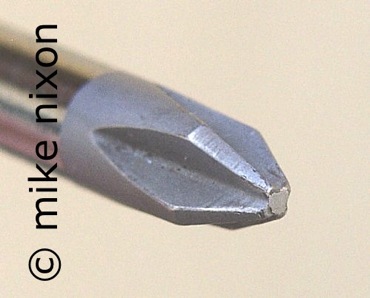 When a Southern California Honda dealer mechanic in the 1970s, I saw more than my share of CB350s, CB450s, and CB750s whose owners had replaced all the engine's Phillips screws with allen screws. To this day I recall with disgust how a simple clutch job on these machines inevitably turned into thread repairs also, usually at my cost. Of course, this was a problem with dept. management more than anything, but if you want to know why I deeply dislike allen screws, there is your answer.
When a Southern California Honda dealer mechanic in the 1970s, I saw more than my share of CB350s, CB450s, and CB750s whose owners had replaced all the engine's Phillips screws with allen screws. To this day I recall with disgust how a simple clutch job on these machines inevitably turned into thread repairs also, usually at my cost. Of course, this was a problem with dept. management more than anything, but if you want to know why I deeply dislike allen screws, there is your answer.
The metal that carburetors are made of is even softer than that of engine crankcases, so they are at much more risk yet of stripped threads than are crankcases. Though many folks seem to like to use allen screws in carburetors, in my book it is a bad choice. The leverage that is inevitably applied to an allen screw is way out of proportion to either the need or the capacity of the part.
It seems the basic motivation folks have for using allen screws is their difficulty with the OEM Phillips screws. This has long been observed in powersports repair shops, wherein vehicles used to arrive with Phillips screw heads so torn up mechanics had to resort to drills and chisels to get them off.
But Phillips screw heads don't need to become mangled in the first place. The first thing to remember to prevent it is this -- the Phillips screwdrivers sold by home improvement stores are made for just that, home improvement, i.e. wood screws, and not mechanical use. There are in fact three or four different shapes of Phillips screwdriver tips, most of which are a bad match with motor vehicle screws, and the ones on hand-held impact tools are grossly inappropriate. Use good screwdrivers! This is 50 percent of the issue.
The other 50 percent is using the correct *size* Phillips screwdrivers. I don't know why, but folks seem determined to use too small a size Phillips in most cases. There is nowhere on a Honda carburetor for example wherein a #1 Phillips is appropriate. Even the VB series choke plate screws are #2 Phillips, as are also the jet needle holding plate screws on SOHC four carbs. Getting the size right is important.
Recently, a lof of folks have been talking about JIS screwdrivers, because they fit Japanese-made screws -- which are JIS spec -- more accurately, thus preventing screw head mangling. This is fine and I prefer them myself. Oddly. pro mechanics never tore up Phillips screw heads back in the 60s and 70s, long before Euro and Asian JIS screwdrivers became available. How did they do that? By using mechanics grade tools, for one thing. I also suspect that since many of us bought our tools through the OEMs, we got JIS screwdrivers without even knowing it, and certainly without the manufacturers promoting the fact that they were JIS.
The fact that JIS, or nearly JIS, screwdrivers exist out there is evident even today. Home Depot's house tool brand, Husky, makes Phillips screwdrivers that, if not JIS, are at any rate very close to JIS or even JIS (according to Wikipedia they are made in Taiwan) and thus much better than the average home improvement store Phillips in terms of fitting Japanese JIS screws properly.
Finally, stainless steel screws. They're pretty, they resist rusting, and they take well to polishing. That's all good. But two things. First, just about all the ones in kits are allen head (technically, socket head). No good, for the reasons outlined above. But more to the point, stainless steel and cast aluminum just don't get along all that well, and the aluminum used in older powersports carbs is the worst of all in this respect. Stainless and cast aluminum react electrolytically (or galvanically), setting up a tiny electrical current that results in the screw seizing in the casting. Very common. If you absolutely *must* use stainless steel screws in your carburetors, put a dab of anti-seize on their threads, and tighten them only with a straight shank allen type screwdriver to limit the torque.
The Phillips screws on Japanese carburetors are good-looking, original, adequate, and pose none of the problems that adtermarket screws do. Properly handled, they outlast the carburetors fhey're fitted to. Use mechanical grade or JIS-spec Phillips screwdrivers, and use the correct size Phillips screwdrivers, and you will have much more success with OEM Japanese Phillips screws.